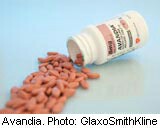
MONDAY, June 28 (HealthDay News) — According to data pooled from several large clinical trials, the diabetes drug Avandia does raise the odds of having a heart attack, bolstering the argument that the drug’s risks might outweigh its benefits in people with type 2 diabetes.
Avandia did not, however, show an increased risk for death from cardiovascular disease, said the authors of a meta-analysis appearing in the June 28 online issue of the Archives of Internal Medicine.
A second study, this one appearing in a companion publication, the June 28 online issue of the Journal of the American Medical Association (JAMA), found that, in patients over the age of 65, taking rosiglitazone (Avandia) carried a higher risk for stroke, heart failure and all-cause death when compared to a similar medication known as pioglitazone (Actos).
Both papers are being published online in advance of a U.S. Food and Drug Administration advisory panel that is set to convene in July to recommend the fate of this best-selling medication.
Whether or not these new results will sway the committee remains to be seen.
“I think it’s pretty compelling scientifically to have both of these studies in advance of the FDA advisory panel meeting, but advisory panels have been very reluctant to take drugs off the market,” said Dr. Steve Nissen, lead author of the Archives analysis and chair of the department of cardiovascular medicine at The Cleveland Clinic. “And it’s very hard for clinicians who are used to using drugs to say they’ve been doing the wrong thing. Clinical inertia is a very big problem in medicine.”
According to background information in the study, Nissen has received payments from various pharmaceutical companies but has contributed all the monies to charity.
Dr. Kirk Garratt, clinical director of interventional cardiovascular research at Lenox Hill Hospital in New York City, conceded that “it doesn’t look good for rosiglitazone,” yet also stated that the FDA “most of the time puts out some kind of warning. I doubt that the risk associated with this drug will be felt to be sufficiently bad that it would warrant taking it off the market.”
In 2007, an FDA advisory committee stated that Avandia did increase the risk of heart attacks but fell short of recommending pulling it off pharmacy shelves.
In February of this year, the FDA said it was still reviewing documents concerning Avandia and wasn’t ready to make any decisions on the drug.
Avandia was first approved by the FDA in 1999 to treat high blood sugar in people with type 2 diabetes.
Suggestions of heart problems first emerged in 2007. Since then, several additional studies have pointed to an increased risk of heart attack, although some research actually pointed to a benefit.
Amid all this controversy, a 2004 court settlement forced GlaxoSmithKline, the maker of Avandia, to make all clinical trial results public.
Nissen and his colleagues searched those results and two other databases, ultimately identifying 56 randomized, controlled trials involving a total of more than 35,500 patients.
Combining data from all these trials revealed that Avandia increased the risk of heart attack by 28 percent to 39 percent, but not the risk of cardiovascular mortality.
Given that cardiovascular disease is already the leading killer of people with type 2 diabetes, the increased risk is significant, the authors stated.
The authors of the JAMA study scoured pharmaceutical records on almost 227,600 Medicare patients participating in the Medicare Part D drug plan. They determined that Avandia increased the risk of heart attacks, stroke or all-cause death when compared with Actos.
The lead author of that report is David Graham, a researcher with the Center for Drug Evaluation and Research, which is part of the FDA. Graham was one of the first government scientists to point out the heart dangers of rofecoxib (Vioxx), a cox-2 inhibitor painkiller that was pulled from the market in 2004. His team’s Avandia study was funded by various governmental offices and agencies, including the FDA.
The analysis found that, compared to people taking Actos, the risk for heart failure was 25 percent higher with Avandia; the risk of stroke was 27 percent higher and the risk of all-cause death was 14 percent higher.
A higher risk for Avandia does make biological sense. Previous research has shown that the drug increases LDL, or “bad,” cholesterol and may also have negative genetic effects associated with an enzyme involved in plaque ruptures in the inner linings of blood vessels.
Both Avandia and Actos, made by Takeda Pharmaceuticals, belong to the class of drugs known as thiazolidinediones.
“This group of drugs is different from most drugs we use. They are actually modifying gene expression,” Garratt explained. “Whenever you’re going in and fiddling with gene expression, you have to be prepared to find unexpected results.”
“The best-case scenario is that rosiglitazone would be neutral and the worst case is that it increases heart failure and cardiovascular events,” said Dr. Robert Scott III, an associate professor of internal medicine at Texas A&M Health Science Center College of Medicine and senior staff cardiologist at Scott & White in Temple. “All the studies to date suggest that it would be perhaps safer to pick pioglitazone.”
A randomized, controlled trial, mandated by the FDA, is being conducted by GlaxoSmithKline and is in the process of recruiting patients.
More information
The U.S. National Library of Medicine has more on thiazolidinediones.

